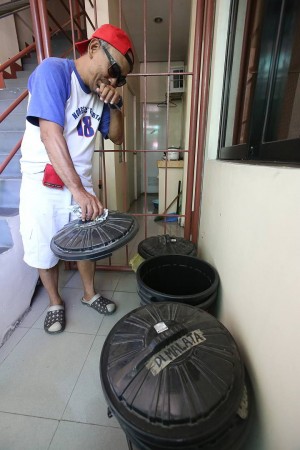
A man covers his nose due to the stench from garbage cans, which includes infectious wastes, at a maternity clinic in north Cebu. (CDN PHOTO/ JUNJIE MENDOZA)
DENR reviewing technical competence of PASSI
After hospital wastes are treated, where do these go?”
This question was posed by Eduardo Llamedo, Department of Environment and Natural Resources (DENR) spokesman, to explain the Environmental Management Bureau’s refusal to authorize private waste management company Pollution Abatement Systems Specialits, Inc. (PASSI) to collect, transport and treat hospital wastes.
Llamedo said PASSI has yet to identify a final disposal site since its president, Engr. Julito Pogoy, made the commitment during a technical conference in November last year.
The lack of a final disposal site was among the violations cited by the EMB regional office for denying PASSI’s application for renewal of its discharge and Treatment, Storage and Disposal (TSD) permits.
Others are the lack of a hazardous waste manifest system and operating without the two permits. Both permits, which are renewed yearly, expired in December last year.
Because of the violations, Llamedo said the EMB is now reviewing the technical competence of PASSI.
READ: Infectious hospital waste piling up in Metro Cebu
Llamedo said “a discharge permit is in the pipeline,” but a final disposal site has yet to be identified. The Inayawan landfill was ordered closed in mid-January by the Cebu city mayor.
Since PASSI started operations in 2005, charging P40 per kilo of wastes collected, it has dumped its treated wastes in Inayawan.
He said the privately operated landfill in Consolacion town is not authorized to handle hospital wastes since it’s not a licensed TSD facility.
Another company listed among EMB’s accredited transporters of hazardous wastes does not have a TSD facility and, thus, could not treat hospital wastes.
“There is no other TSD facility in Cebu,” Llamedo said.
He called on hospitals, medical laboratories, birthing centers and other health care facilities to treat their wastes themselves.
More than 30,000 kilos of infectious hospital wastes from over 100 hospitals and health care facilities in Metro Cebu remain uncollected since March 18, when PASSI was forced to stop operations.
Hospital representatives said their temporary storage facilities were close to overflowing and petitioned the Cebu city government for assistance.
“The root cause of this problem is that hospitals are not treating their wastes. It’s very simple. There’s a chemical that is used to disinfect the wastes and they have the capability to conduct microbiological testing,” Llamedo said.
He said four hospitals were fined P10,000 each for failure to treat their wastes.
These were St. Anthony Mother and Child, Adventist Hospital, Talisay City District Hospital and Minglanilla District Hospital.
In a statement to the media yesterday, Pogoy said his company complied with all requirements for the approval of their amended Environmental Compliance Certificate (ECC) and the renewal of their discharge and TSD permits.
“Uncollected infectious waste is not just the concern of our hospitals, clinics, laboratories and laying-in centers. It is the concern of the entire community,” Pogoy wrote. He appealed for help from the city government and DENR.
He said PASSI had no issue with the renewal of their permits until the middle of 2014, when they applied for an amendment to the ECC issued to them in 2005 to include the construction of a multi-chamber containment facility in preparation for the closure of the Inayawan landfill.
Pogoy said they were hoping to complete and use the containment facility by the end of the year. DENR, however, issued a cease-and-desist order against PASSI in November last year.
Pogoy said PASSI continued operating until February, “just opting to settle the fines” to ensure that infectious wastes are collected and treated.
“Challenging the DENR’s authority was not our intent,” he wrote, adding that they communicated with the DENR several times.
“As can be gleaned in the records, we complied with every requirement they threw our way,” he added.
He said EMB inspected their containment facility on February 11 this year and recommended the upgrading of their waste water treatment facility (WTF), a prerequisite for the issuance of a discharge permit.
Despite their compliance and the conduct of another inspection on March 23, Pogoy said their amended ECC was not approved nor was a discharge permit issued.
“DENR instead cited us for failing to install overflow pipes for the WTF. They also wanted our dewatering unit moved,” Pogoy said.
He said they complied and sent a letter and photos to prove this on April 14, “for which we have not yet been given the courtesy of a reply.”
Llamedo said EMB required the upgrading of PASSI’s waste treatment facility because it has achieved its threshold carrying capacity.
Meanwhile, Mary Claire Maternity Clinic in barangay Tinago has been disposing of its infectious waste at their placenta pit in Tayud, Consolacion.
Sheravel Mendez, midwife, said they dispose of at least three placenta wastes daily. The placenta, or afterbirth, is an organ that connects the fetus to the uterine wallduring pregnancy.
“Motawag gyud mi dayon na ipakuha ang mga placenta waste kay mobaho na siya within 24 hours (We have to dispose of it immediately because it smell bad within 24 hours),” she said.
The placenta waste is placed inside a yellow plastic bag soaked with Zonrox. This is then placed inside a black drum at the back of the recovery room.
Sharp objects, such as syringes, are placed inside a sealed gallon.
Disclaimer: The comments uploaded on this site do not necessarily represent or reflect the views of management and owner of Cebudailynews. We reserve the right to exclude comments that we deem to be inconsistent with our editorial standards.
